虚拟语气4
(完整版)英语虚拟语气语法归纳总结
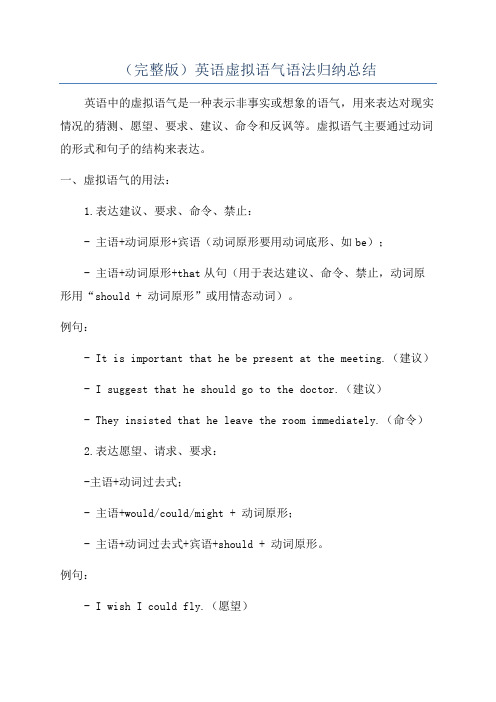
(完整版)英语虚拟语气语法归纳总结英语中的虚拟语气是一种表示非事实或想象的语气,用来表达对现实情况的猜测、愿望、要求、建议、命令和反讽等。
虚拟语气主要通过动词的形式和句子的结构来表达。
一、虚拟语气的用法:1.表达建议、要求、命令、禁止:- 主语+动词原形+宾语(动词原形要用动词底形、如be);- 主语+动词原形+that从句(用于表达建议、命令、禁止,动词原形用“should + 动词原形”或用情态动词)。
例句:- It is important that he be present at the meeting.(建议)- I suggest that he should go to the doctor.(建议)- They insisted that he leave the room immediately.(命令)2.表达愿望、请求、要求:-主语+动词过去式;- 主语+would/could/might + 动词原形;- 主语+动词过去式+宾语+should + 动词原形。
例句:- I wish I could fly.(愿望)- I would appreciate it if you could help me.(请求)3.表示虚拟条件:- If条件从句中的谓语动词用过去完成时,主句用would/should/might/could + have + 过去分词;- If条件从句中的谓语动词用过去时,主句用would/should/could + 动词原形。
例句:- If I had known his phone number, I would have called him.(虚拟条件)- If you had listened to me, we could have finished the project earlier.(虚拟条件)4.表达建议、要求、祝愿:- If only内部称述 + 主语 + 过去式。
虚拟语气(高考频度4颗星)

虚拟语气(高考频度4颗星)一、概念用来表达非真实的情况:愿望、假设、空想、白日梦…“说假话”二、类型(1)、should do表示建议、命令、安排等从句标志:主句中出现关键词:suggest/advise/propose 建议、提议recommend推荐,order命令,demand/require/urge要求request请求,arrange安排,insist坚持…I suggest that you (should)mind your own business.我建议你管好你自己。
Suggest除了建议,还有显示、暗示的含义, 此时不用虚拟语气Insist除了坚持做某事,还有坚定事实、强调观点的含义,此时不用虚拟语气He insists that he is innocent.The chat history suggests that what he said was a lie.(2)if 条件句:回到过去,即如果怎样…就会怎样…/假设怎样…结果会怎样…表达不会实现的愿望、相反的假设、对过去的遗憾Should 一般用于第一人称I/weWould 表示结果、过去常做某事Might 表示可能性Could 表示能力、允许、可能性If you tried again, you would succeed. 表结果If you tried again, you might succeed. 表可能If you tried again, you could succeed. 表能力1、对过去虚拟If 从句:had done主句:would/should/could/might have doneIf you had said it out loud at the beginning, he might have said yes.If you had got there earlier, you could have met him.If you had taken my advice, you would not have failed in the test.If I had left earlier, I would have caught the train.2、对现在虚拟If 从句:did/were主句:would/should/could/might doIf I were you, I should study hard.I would certainly go if I had time.3、对将来虚拟If 从句:did/should do/were to do 主句:would/should/could/might doIf it were to rain tomorrow, I would completely freak out.整个人就不好了。
考研英语中虚拟语气的4种用法
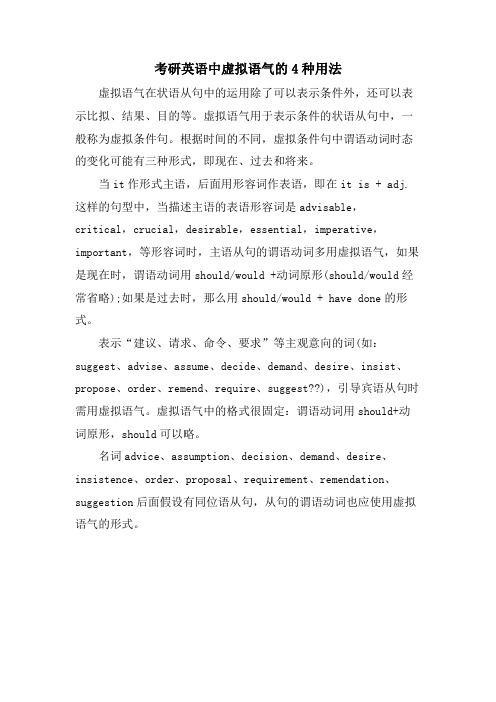
考研英语中虚拟语气的4种用法
虚拟语气在状语从句中的运用除了可以表示条件外,还可以表示比拟、结果、目的等。
虚拟语气用于表示条件的状语从句中,一般称为虚拟条件句。
根据时间的不同,虚拟条件句中谓语动词时态的变化可能有三种形式,即现在、过去和将来。
当it作形式主语,后面用形容词作表语,即在it is + adj.这样的句型中,当描述主语的表语形容词是advisable,
critical,crucial,desirable,essential,imperative,important,等形容词时,主语从句的谓语动词多用虚拟语气,如果是现在时,谓语动词用should/would +动词原形(should/would经常省略);如果是过去时,那么用should/would + have done的形式。
表示“建议、请求、命令、要求”等主观意向的词(如:suggest、advise、assume、decide、demand、desire、insist、propose、order、remend、require、suggest??),引导宾语从句时需用虚拟语气。
虚拟语气中的格式很固定:谓语动词用should+动词原形,should可以略。
名词advice、assumption、decision、demand、desire、insistence、order、proposal、requirement、remendation、suggestion后面假设有同位语从句,从句的谓语动词也应使用虚拟语气的形式。
4中常见虚拟语气

(1)could have been:本来可以,本可以是,表示虚拟语气。
Mistakes are creeping in which could have been avoided. 本可避免的错误都逐渐一一发生了。
It could have been worse.事情可能更坏,这是不幸中的大幸。
The performance could have been better.这次表演原来可以更好些的。
(2)补充:Had paul received six more votes in the last election , he __ our chairman.为什么不是would have been 而是would be?这句话的原文是If paul had received six more votes in the last election, he would be our chairman. 去掉If 把had提前了,从句是过去完成时,主句用would be 表示与现在事实相反的非真实条件句,如果用would have been 就表示与过去相反了,就不对了。
做这个要了解是对什么时候的虚拟(3)could have been表示过去可能,但是没做的事情可能是。
Should have been表示应该would have been表示主观意愿上将做什么事,会是would have + 过去分词的句型在虚拟语气中表达与过去事实相反的情况从句:If 主语+had+done主句:主语+should/would/could/might+have done例如: 1. If I had got there earlier,I should/could have met her. 如果我早到那儿,我就会见到她。
(事实:去晚了) 2.If he had taken my advice,he would not have made such a mistake. 如果他听我的劝告的话,就不会犯这样的错误了。
虚拟语气 专四考点

虚拟语气考点1. If从句中的虚拟语气省略if,从句的语序用到装,即将were, had或should移至主语的前面,但否定词not 不前移。
1、与过去事实相反:从句sb had done,主句sb would(should,could,might)+ have done;1. Had Judy been more careful on the maths exam, she ____ much better results now.2008A. would be gettingB. could have gotC. must getD. would get2.___, he would not have recovered so quickly.2005/1995A. Hadn't he been taken good care ofB. Had he not been taken good care ofC. Had not he been taken good care ofD. Had he been not taken good care of3. I ___the party much more if there hadn’t been quite such a crowd of people there.2004/1996A. would enjoyB. will have enjoyedC. would have enjoyedD. will be enjoying4. All of us would have enjoyed the party much more if there ___ quite such a crowd of people there.2004/2000A. weren’tB. hasn’t beenC. hadn’t beenD. wouldn’t5. ___for the fact that she broke her leg, she might have passed the exam.2002A. Had it not beenB. Hadn’t it be enC. Was it notD. Were it not6. _____enough time and money, the researchers would have been able to discover more in this field.1998a. Givingb. To givec. Givend. Being given7. _____ time, he’ll make a first-class tennis player. 1996A. HavingB. GivenC. GivingD. Had8We could ___him with a detached house when he came, but he had specifically asked for a small flat.1995A. provideB. have providedC. not provideD. not have provided9. ______you were busy, I wouldn’t have bothered you with my questions. 1994A. If I realizedB. Had I realizedC. I realized thatD. As I realized10. _____ their help, we would not have succeeded.1992A. Hadn't been forB. Had it not been forC. It hadn't been forD. Had not it been for11. If you _____ in such a hurry you sugar into the sauce instead of salt.1992A. were not, would not putB. were, would putC. had been, would have putD. had not been, would not have put12. "Did you hear of his death?'"Yes. If he ___ in time, he ___.”1990A. had been operated on, might not dieB. had been operated on, might not have diedC. were operated on, might not dieD. were operated on,- might not have died2、与现在事实相反:从句sb did(were),主句sb would(should, could, might)+do;1. If there were no subjunctive mood, English _____ much easier to learn.2009A. could have beenB. would beC. will beD. would have been2. “You ______ borrow my notes provided you take care of them,” I told my friend. 2007A. couldB. shouldC. mustD. can3. If you explained the situation to your solicitor, he ________ able to advise you much better thanI can.2005A. would beB. will have beenC. wasD. Were4. If I knew Japanese , I ______ for the position.1991A. would applyB. will applyC. may have appliedD. will have applied3、与将来事实相反:从句sb did (should+do或were+to do),主句sb would (should, could, might)+do。
虚拟语气4大类型
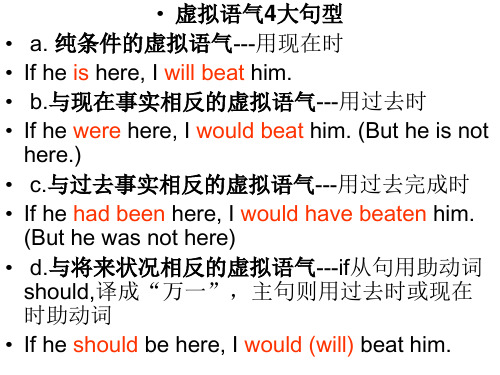
•
• 虚拟语气 大句型 虚拟语气4大句型 a. 纯条件的虚拟语气 纯条件的虚拟语气---用现在时 If he is here, I will beat him. b.与现在事实相反的虚拟语气 与现在事实相反的虚拟语气---用过去时 与现在事实相反的虚拟语气 If he were here, I would beat him. (But he is not here.) c.与过去事实相反的虚拟语气 与过去事实相反的虚拟语气---用过去完成时 与过去事实相反的虚拟语气 If he had been here, I would have beaten him. (But he was not here) d.与将来状况相反的虚拟语气 与将来状况相反的虚拟语气---if从句用助动词 与将来状况相反的虚拟语气 should,译成“万一”,主句则用过去时或现在 时助动词 If he should be here, I would (will) beat him.
பைடு நூலகம்
• 使用时机及要点: • 1.表与过去事实相反,换言之,当时事实并非如 此。 • 2. 注意if从句中的had与had had的区别。试比较 以下这两句话: • If he had money, he would buy a car. • If he had had money, he would have bought a car. • If he had money, he would have bought a car.
• If 的省略 • 虚拟语气的if 从句中,若有过去完成时助动词had、或 表示 “万一”的助动词should或是were出现时,可将 这些词置于主语前,而省略掉if. • a. had • 如果当时他做了这件事,他会后悔的。 • If he had done it, he would have felt sorry. • =Had he done it, he would have felt sorry. b. should 万一他说谎,我会处罚他。 If he should tell lies, I would punish him. =Should he tell lies, I would punish him. c. were 如果他懒惰,就可能会失败。 If he were lazy, he might fail. =were he lazy, he might fail.
九年级unit4虚拟语气知识点
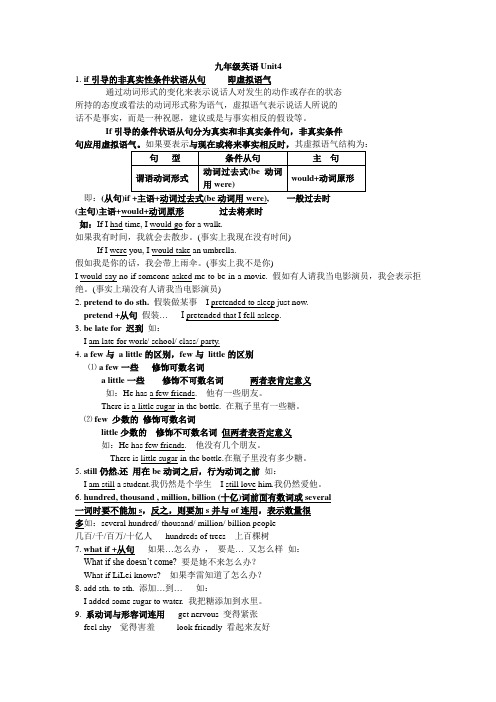
九年级英语Unit41. if引导的非真实性条件状语从句即虚拟语气通过动词形式的变化来表示说话人对发生的动作或存在的状态所持的态度或看法的动词形式称为语气,虚拟语气表示说话人所说的话不是事实,而是一种祝愿,建议或是与事实相反的假设等。
If引导的条件状语从句分为真实和非真实条件句,非真实条件句应用虚拟语气。
如果要表示与现在或将来事实相反时,其虚拟语气结构为:句型条件从句主句谓语动词形式动词过去式(be动词用were)would+动词原形即:(从句)if +主语+动词过去式(b e动词用were), 一般过去时(主句)主语+would+动词原形过去将来时如:If I had time, I would go for a walk.如果我有时间,我就会去散步。
(事实上我现在没有时间)If I were you, I would take an umbrella.假如我是你的话,我会带上雨伞。
(事实上我不是你)I would say no if someone asked me to be in a movie. 假如有人请我当电影演员,我会表示拒绝。
(事实上瑞没有人请我当电影演员)2. pretend to do sth.假装做某事I pretended to sleep just now.pretend +从句假装… I pretended that I fell asleep.3. be late for 迟到如:I am late for work/ school/ class/ party.4. a few与 a little的区别,few与little的区别⑴a few一些修饰可数名词a little一些修饰不可数名词两者表肯定意义如:He has a few friends. 他有一些朋友。
There is a little sugar in the bottle. 在瓶子里有一些糖。
⑵few 少数的修饰可数名词little少数的修饰不可数名词但两者表否定意义如:He has few friends. 他没有几个朋友。
虚拟语气句型 4 (错综时间虚拟条件句)
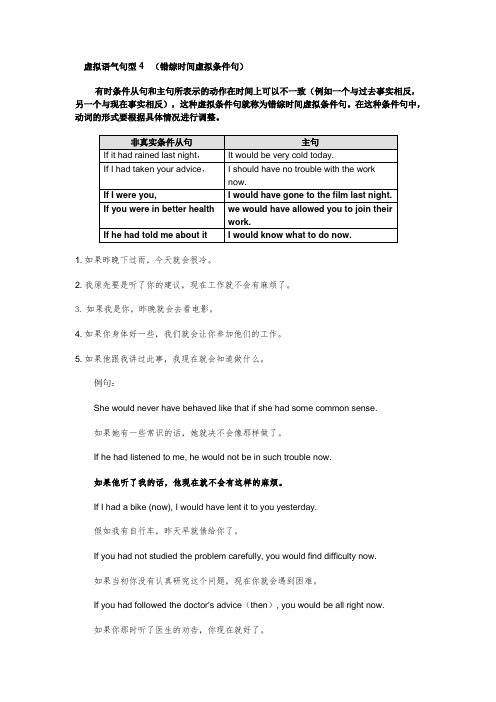
虚拟语气句型 4 (错综时间虚拟条件句)有时条件从句和主句所表示的动作在时间上可以不一致(例如一个与过去事实相反,另一个与现在事实相反),这种虚拟条件句就称为错综时间虚拟条件句。
在这种条件句中,动词的形式要根据具体情况进行调整。
1. 如果昨晚下过雨,今天就会很冷。
2. 我原先要是听了你的建议,现在工作就不会有麻烦了。
3.如果我是你,昨晚就会去看电影。
4. 如果你身体好一些,我们就会让你参加他们的工作。
5. 如果他跟我讲过此事,我现在就会知道做什么。
例句:She would never have behaved like that if she had some common sense.如果她有一些常识的话,她就决不会像那样做了。
If he had listened to me, he would not be in such trouble now.如果他听了我的话,他现在就不会有这样的麻烦。
If I had a bike (now), I would have lent it to you yesterday.假如我有自行车,昨天早就借给你了。
If you had not studied the problem carefully, you would find difficulty now.如果当初你没有认真研究这个问题,现在你就会遇到困难。
If you had followed the doctor's advice(then), you would be all right now.如果你那时听了医生的劝告,你现在就好了。
If you hadn’t finished the homework by now, you would not be allowed to see the film this evening.假如你现在还没有完成作业,就不会允许你今晚去看电影。
句型说明:错综时间条件句中,特别注意时间状语,在这种情况下必须明确给以时间或通过上下文可明白看出时间不同,否则就按前面表格中一般时间搭配使用。
- 1、下载文档前请自行甄别文档内容的完整性,平台不提供额外的编辑、内容补充、找答案等附加服务。
- 2、"仅部分预览"的文档,不可在线预览部分如存在完整性等问题,可反馈申请退款(可完整预览的文档不适用该条件!)。
- 3、如文档侵犯您的权益,请联系客服反馈,我们会尽快为您处理(人工客服工作时间:9:00-18:30)。
Eliza remembers everything exactly as if it ____________ yesterday. (2006 全国) A. was happening B. happens C. has happened D. happened
她看起来似乎是冰做的
she looks as if she were made of ice.
在as if/as though引导的状语从句中,谓语 动词多用虚拟语气。例如: The man speaks as if he were a foreigner.
They talked as if they had been good friends for years.
It is high time that the children should go to bed.
summary
It’s (about/high) time +that
过去时(were) Should(不省) +V.
did
It’s high time that you went. 你该走了。 It’s high time that you should go.
If only 与 I wish一样,也用于表示与事实相 反的愿望,其后所虚拟语气的时态与 wish后 所接时态的情况相同。 现在: did(were) wish/if only
过去:had done
未来:would do
If only I were better looking. 要是我长得漂亮些就好了。 If only I had listened to my parents! 我要是当时听了父母的话就好了。 If only she would go with me! 她要是愿意和我一道去就好了
虚拟语气在in case,lest或for fear that等从 4 句中的用法
in case,lest或for fear that引起的从句常用 虚拟语气,表示“以防,以免”,形式为 should+动词原形,should通常不能省略. He took his raincoat with him in case it should rain. The young driver looked over the engine carefully lest it should go wrong on the way. She put a blanket over the baby for fear that he should catch cold. 她在那个婴儿 身上盖上了毯子以免他着凉。
2.而 if only 有两个意思,一是表示“只要”, 此时通常与陈述语气连用,与 as long as用 法相似;二是表示“但愿”“要是……就好 了”,此时多与虚拟语气连用。如:
If only it clears up, we’ll go.
只要天晴,我们就去。
④常见的几种固定句式。 如If only, insist, suggest 及It’s time/necessary/important that从句等等。 ★If only I to my parents’ advice! A. listening B. listen C. am listening D. had listened
虚拟语气的特殊句式
1. It is (high) time that
It is (high) time that 后面的从句 谓语动词要用过去式或用should 加动词原形,但should不可省略, 注意多用过去式。 It is time that the children went to bed.
only if 与 if only 的差别 1.only if “只有……(才),只有在……的时候,唯一 的条件是……”的意思。 I wake up only if the alarm clock rings. 只有闹钟响了,我才会醒。 I told him he would succeed only if he tried hard. 我告诉他,只有努力才能成功。 注意:only if 有时也写成only...if,表示唯一的条 件,但是意思不变。例如: I will only come home if you come with me. (= I will come home only if you come with me.) 只有你跟我一起走,我才回家。
√
★His silence at the meeting suggested that he to your plan. A. shouldn’t agree B. wouldn’t agree C. hadn’t agreed D. didn’t agree
√
√
★ The old professor gave orders that the experiment before 6. A. was finished B. will finish C. be finished D. shall be finished
我们该去
It’s time that we went to bed.
睡觉了。 It’s time that we should go to bed.
1.It is high time you ______ the bus. A. had caught B. caught C. will catch D. catch 2.It’s about time he ______ to do the work. A. begins B. will begin C. begin D. began 3. It’s high time that we ___ to school. A. would go B. went C. go D. will go 4.It is time we ___ up our results. A. sum B. summed C. will sum D. would sum
if only用在虚拟语气中,用以表达强烈的愿望 或非真实条件.常被译为“但愿”,“要是……该多好啊 If only she could have lived a little longer. 要是她能活得再长一些,那该多好啊! If only I were as clever as you! 要是我像你一样聪明该多好啊!
Even if it had been a rainy day, I would have gone to see her.
★
他们就像多年的朋友一样交谈。
They talked as if they had been friends for years.
★
他看上去像是醉了。
He looks as if he were drunk.
√
Practice
were 1. Even if he _______(be) here, he couldn’t solve the problem. would be 2. Without air, there __________(be) no living things. 3. But for your help, I __________________ couldn’t have done (not, do) it well. had taken 4. If only I ____________(take) his advice, but I didn’t. 5. I was very busy yesterday, otherwise I would have come _________________(come) to the meeting. 6. Look at the clock! It’s (high) time we _______________(go) home. went/should go
注意
if only从句在大多数情况下用作虚拟条件句,但是 偶尔也有用在真实条件句的情况, if only引导的条 件句,通常用来表示说话人对某事所寄予的某种 强烈愿望,相当于as long as。 。例如: He will succeed if only he does his best. 只要 他竭尽全力,他就会成功。
5 在表达美好愿望的祝愿用语中使用虚拟语气。
God bless you!
Long live my motherland! Heaven help him! May you succeed! Long live the People’s Republic of China!
虚拟语气练习题:
t in the sofa. A. have B. had C. have had D. will have 2. –You should have gone to the cinema with us yesterday. It’s very good. –I wished I ___ , but I was busy with my A report. A. had B. did C. would have D. were
★ It’s high time he A. goes B. went
√
home.
C. will go
D. is going to go
★Even if he _______(be) here, he couldn’t solve the problem. A. was B. were C. be D. is
